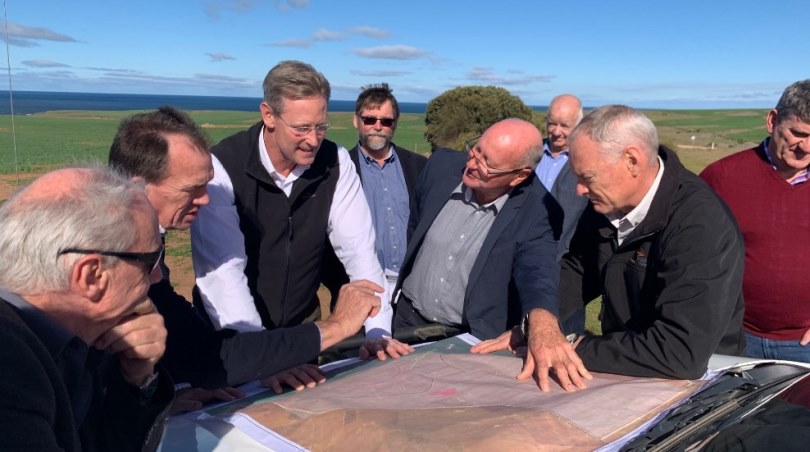Agreement creates pathway for Australia’s first green credentialed manufacturing and export complex.
Iron Road Limited is pleased to announce that the Company has signed a Heads of Agreement and Project Development Accord with The Hydrogen Utility (H2U), an Australian hydrogen infrastructure developer and renewable energy integrator. Iron Road and H2U will work collectively to develop the green manufacturing precinct at Cape Hardy.
With support under the South Australian Government’s Renewable Technology Fund (RTF), H2U expects to commence site development of the ‘Green Hydrogen and Ammonia Supply Chain Demonstrator’, a distributed electrolysis and ammonia production facility early next year at Port Lincoln. Cape Hardy was identified by H2U as the preferred location for future development of a larger green hydrogen production and export hub. In addition to technical investigations to be undertaken by H2U, the new 200 hectare green manufacturing precinct will now be incorporated into the Master Plan for the 1,100 hectare Cape Hardy site. H2U and Iron Road will also jointly develop a commercialisation pathway and engage with synergistic investors.
Iron Road Managing Director, Mr Andrew Stocks, noted that the Central Eyre Iron Project (CEIP) will unlock significant benefits well beyond the project’s mining and ore processing operations.
“The Cape Hardy deep water port proposal is a true multi-user, multi-commodity model, unlike anything else proposed in the country. This was a key driver of Infrastructure Australia’s positive business case evaluation and subsequent recognition of the port as a Priority Project for the nation. With EPCBH and H2U, we are catering for mineral, agricultural, and clean energy exports.
“We welcome the addition of H2U and look forward to working with their team, EPCBH and others to advance this exciting project,” Mr Stocks said.
H2U CEO, Dr Attilio Pigneri said that the green manufacturing precinct will seek to satisfy the growing world demand for decarbonised industrial products and energy.
“The Hydrogen infrastructure to be built at Cape Hardy, integrated with the world-class renewable energy resource on the Eyre Peninsula positions the region to grow exports as the markets for decarbonised energy and industrial chemicals in North Asia grow.
“This provides an enormous opportunity for further manufacturing industries to develop and value add to the agricultural, mineral and energy resources of the Peninsula. It opens up an entirely news, green manufacturing precinct for South Australia to grow the regional and State economy and employment,” Dr Pigneri said.
The Agreement with H2U is complementary to the existing agreement with farmers’ cooperative, EPCBH, where the parties are working together to develop a new grain supply chain network utilising the facilities at Cape Hardy. The rapidly changing nature of grain consolidation and collection in the region has once again highlighted the importance of an alternative grains export pathway. EPCBH’s Chair Mr Bruce Heddle said that EPCBH was pleased to see the Cape Hardy precinct open to a new industry.
“Cape Hardy will provide an important alternate route to market for produce grown by the region’s 700 farming families. We welcome the incorporation of the green manufacturing precinct at Cape Hardy and look forward to working with H2U to explore the potential distribution of locally produced ammonia,” Mr Heddle said.
Regional Development Australia Whyalla and Eyre Peninsula (RDAWEP) is a strong advocate for the project. CEO, Mr Dion Dorward, commented that the agreements are proactively supported by RDAWEP’s strategy to diversify the region’s economy, be globally competitive and improve energy and freight supply chains.
Central Eyre Iron Project Update
Engagement with investors and potential project partners on the less capital intensive and lower risk revised CEIP delivery model continues. Mr Stocks added, “While the stock market continues to have little appetite for development projects that require a significant financing, we remain encouraged by levels of engagement shown by certain parties with respect to reassessing the value proposition and optionality for an advanced, high grade iron concentrate development opportunity.”
For further information visit www.ironroadlimited.com.au
About The Hydrogen Utility
H2U is a privately-funded technology company focused on the production of decarbonised (green) Hydrogen and hydrogen derivative chemicals from electrolysis using flexible supplies of renewable energy to meet the growing global market for decarbonised products.
H2U partners with the global supply chains for Hydrogen technologies and equipment manufacturers to match their proprietary technology and competencies in Hydrogen production to integrate these Hydrogen technologies with renewable energy supplies.
H2U is the developer of the Port Lincoln Green H2/NH3 Supply Chain Demonstrator, a 30-40 MW electrolysis and distributed ammonia production plant at Port Lincoln.
H2U is actively engaging with emerging hydrogen economies in North Asia, and has been inducted in the Green Ammonia Consortium, launched in Tokyo on July 1, 2019.
About Eyre Peninsula Co-operative Bulk Handling Limited (EPCBH)
Formed in August 2017 by a group of prominent Eyre Peninsula farmers, EPCBH will pursue opportunities to improve competitiveness for grain growers. EPCBH aims to enhance returns to growers and farm businesses using a collaborative approach. During the past 10 years EP farmers have grown an average of 2.5 million tonnes of grain each year, with over 90% of that grain exported. The strong penetration by others, such as the Ukraine and Russia, into Australia’s traditional export markets in Southeast Asia, demands that storage and handling chains be globally competitive.
Image: Andrew Reeves, Renascor Resources; Peter Treloar, Member for Flinders; Dan Van Holst Pellekaan, Minister for Energy and Mining; Dion Dorward, RDAWEP; Tim Scholz, Iron Road; Bryan Trigg, RDAWEP; Larry Ingle, Iron Road; and Dr Tristram Travis, H2U inspect the Cape Hardy port site in July 2019.

